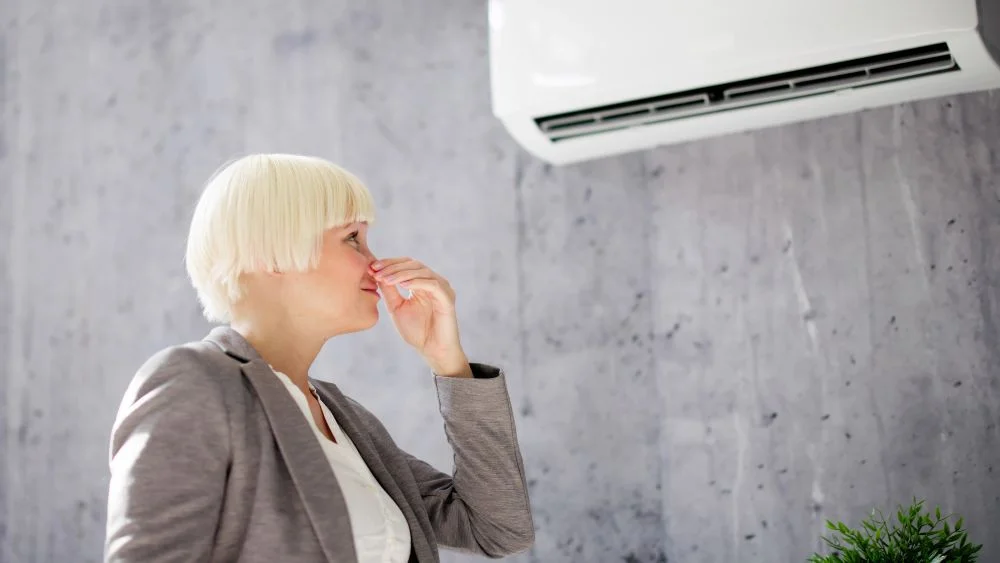
Key Takeaways
- The most common AC smell is a musty odor that indicates mold or mildew growth.
- A car exhaust smell typically indicates a refrigerant leak.
- The rotten egg smell indicates dead rodents or critters inside your AC.
Imagine this: You arrive home after a long, sweltering day, tired and sweaty.
Eager to find relief from the heat, you kick off your boots, jump on the sofa, and switch on your trusty air conditioner. But instead of being greeted by refreshing cool air, an unpleasant odor permeates the room, forcing you to turn off the AC hastily.
As frustration sets in, you wonder why your air conditioner is doing this, and of course, there’s the concern that this unwelcome odor might lead to even more expenses down the line.
Let’s explore common AC smells that you might encounter, the underlying causes, and practical solutions to eliminate them.
- 1. Air Conditioner Smells Like Car Exhaust
- 2. Air Conditioner Smells Like Cigarette Smoke
- 3. AC Smells Like Burning or Something Is on Fire
- 4. AC Smells Like Rotten Eggs
- 5. Air Conditioner Smells Like Dirty Socks
- 6. AC Smells Like Gas or Skunk Spray
- 7. Air Conditioner Smells Musty
- Safety Precautions to Take When Fixing AC Odor Issues
- Health Issues Associated With Smelly Air Conditioners
- In Conclusion
1. Air Conditioner Smells Like Car Exhaust
A car exhaust smell from your AC most likely means there is a leak in your refrigerant line. A refrigerant is a cooling agent inside your air conditioner, and a leak can impact its performance. Moreover, it releases chemicals into the air, deteriorating the quality of indoor air and thus posing a hazard to the environment.
Refrigerant fumes can also be unhealthy upon inhalation and may induce conditions such as nausea or headaches with prolonged exposure.
How to Fix
- A refrigerant leak isn’t something to be dealt with on your own. You should get the leak checked promptly by a professional.
- While you’re waiting for an expert to arrive, turn off your HVAC unit. Open the windows and ensure your home is well-ventilated. This will keep the smell out and prevent any hazardous effects from the chemical leak.
2. Air Conditioner Smells Like Cigarette Smoke
If you smoke at home, there is a chance that your AC will eventually smell like stale cigarette smoke. Air conditioners work by circulating indoor air, passing it through the coils and the air filter. Over time, these components are able to absorb and capture smoke particles. These trapped particles may get dislodged when you start your AC, hence the smoky smell.
Another common cause is dirt or debris trapped inside the coils or housing. When the system heats up, this debris can burn slightly, producing a smoke-like odor.
How to Fix
- Clean your filters regularly. If you have ductless systems like mini-splits, use smart thermostats for mini-splits to stay on top of your filter maintenance. It provides timely notifications when it’s time for cleaning.
- If your air filter is heavily saturated with smoke particles, replace it with a high-efficiency HEPA filter for better odor control.
- Cigarette residue can also accumulate on your AC coils, resulting in unpleasant odors. Cleaning the coils can help eliminate this issue.
Your best choice to make any mini-split, window,
or portable AC smart. Enhance your comfort and savings.

3. AC Smells Like Burning or Something Is on Fire
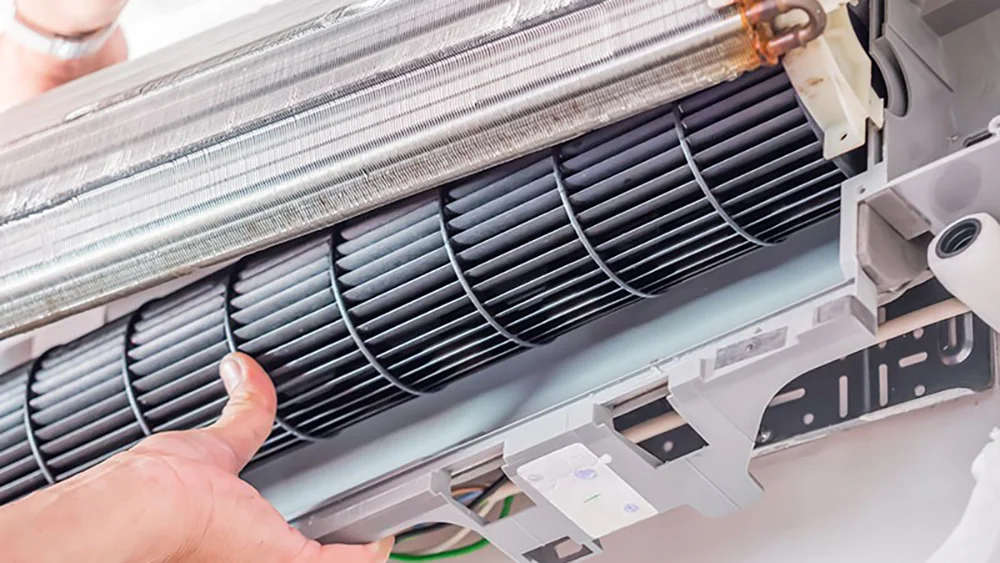
If your AC smells like burning gunpowder or plastic, it probably means one or multiple of components are burning.This could be caused by a short circuit that affects the electrical components. If you continue to use the AC in this condition, it could raise the risk of a fire in your home.
The overheating of the internal components, particularly the wiring, motor, or fan, can also result in a burning AC smell. Excessive heat can cause the insulation on the wiring to burn.
Another common reason for this air conditioner smell is that dust can accumulate within your unit after prolonged periods of inactivity. This dust can burn off and emit a bad smell when the AC is turned on after a long time. This is only temporary and should not cause concern.
How to Fix
- Turn off the AC immediately to prevent further damage or potential electrical hazards.
- Call a licensed HVAC technician who can diagnose the issue, replace any damaged wiring or components, and ensure your unit operates safely.
4. AC Smells Like Rotten Eggs
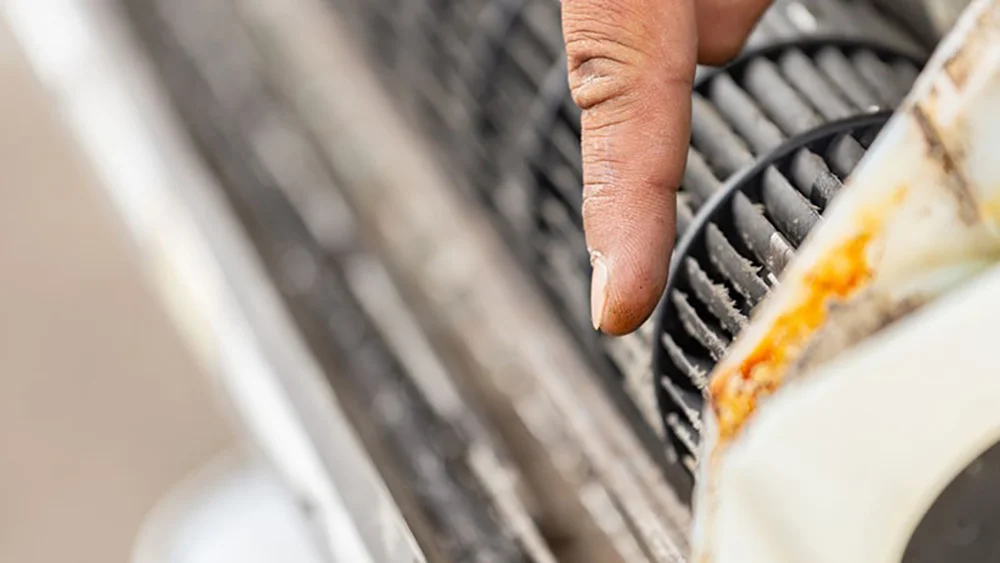
A foul or rotten smell from an air conditioner is usually the result of dead rodents or other critters trapped inside the unit.
Rodents, insects, and birds can nest in your air conditioner and, unfortunately, can get trapped in the equipment. With time, these dying animals emit unpleasant smells. As soon as you turn your air conditioner on, it can discharge a foul smell into your home. Dying or stuck animals can also damage different components within your AC.
How to Fix
- It’s best to contact a professional to handle this issue as dealing with dead animals involves potential health hazards. They have specialized tools to locate and remove the dead animal, as well as to sanitize the affected areas.
- However, if you choose to remove the animal yourself, be sure to wear gloves and a face mask and securely seal the animal in a strong plastic bag.
Related: Rodent Proof Ductwork: 6 Ways to Get Rid of Rats in Your Air Ducts
5. Air Conditioner Smells Like Dirty Socks
If your air conditioner smells like dirty socks or feet, mold or mildew growth within the system is likely the culprit. This unpleasant odor, often referred to as “dirty sock syndrome,” occurs when moisture accumulates on the evaporator coils and isn’t properly drained away. Poorly sealed ducts, dirty air filters, and coils can also result in a musty smell.
The dark, damp environment inside the AC unit provides an ideal breeding ground for mildew and bacteria, which can produce a musty, foul smell. This issue is more common in environments with high humidity.
A musty, vinegar-like smell can also be an indicator of an older air conditioner (made before 2010) that uses a liquid coolant containing chlorine. This coolant can damage the motor and cause the unit to produce higher levels of ozone, which can be harmful to your health.
How to Fix
- Be sure to keep up with your air filter maintenance. Clean them every two weeks and replace them every 3-4 months.
- To eliminate the odor, clean the coils, which can be done either by a professional or as a DIY project if you are familiar with AC maintenance. Cleaning the coils removes mold and bacteria buildup, helping to get rid of the smell.
- Additionally, ensuring that your AC drain lines are clear and functioning properly is crucial to prevent future moisture accumulation.
- If you have an older unit, it’s best to contact a local HVAC technician for an inspection.
6. AC Smells Like Gas or Skunk Spray
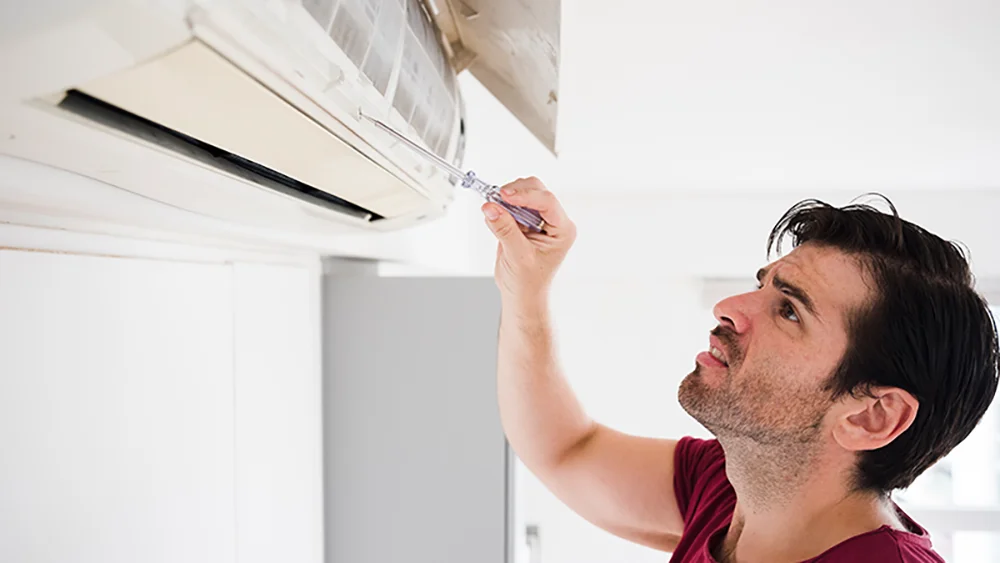
This air conditioner smell is the most alarming one on this list. More often than not, this indicates gas leakage within the system, specifically Methyl Mercaptan.
Natural gas has no smell on its own, but utilities and gas distributors add Methyl Mercaptan to give it a distinctive odor. This ensures immediate detection to prevent any serious harm from gas leakage.
If your AC smells like skunk spray, you won’t be mistaken. This means that gas is leaking into your ductwork.
How to Fix
- Immediately turn off your gas supply at the first sign of such a smell and evacuate your home. Then contact your utility company, which will detect the source and repair the problem.
7. Air Conditioner Smells Musty
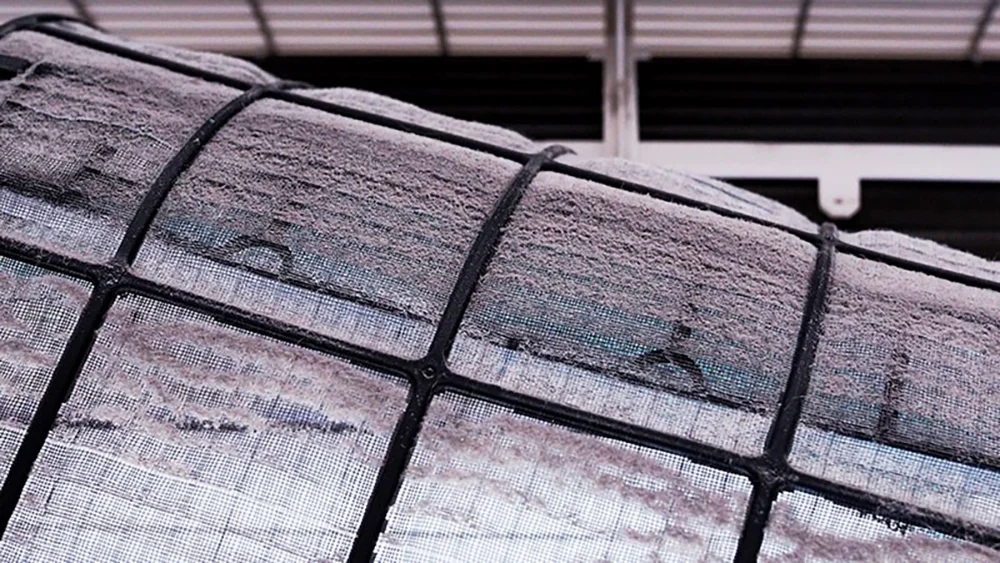
When your AC smells musty, damp, or moldy, it is a good indication that you are dealing with moisture issues. This is among the most prevalent reason why an air conditioner smells.
As your AC removes humidity from the air, it needs to drain the excess water properly. If the drip pan is damaged or the condensate line becomes clogged, standing water can accumulate and develop mold.
Another reason for such a smell can be dirty filters. For example, if you live in a hot and humid climate moisture can accumulate in your filters and cause mold growth.
A system that’s too large cools the space too quickly without removing enough humidity, while a system that’s too small may run constantly and struggle to keep up. Both scenarios can contribute to excess moisture and musty odors.
Moisture can build up inside your ductwork, leading to mildew and mold growth. Visiible signs may include water dripping from vents, walls, or ceilings.
How to Fix
- Clean the drain line as part of your HVAC maintenance routine.
- Clean and replace air filters regularly to prevent musty AC smell.
- In case of incorrect AC size, a qualified HVAC technician can assess your system to determine if replacement is required.
- You will need to contact a professional to get the ducts thoroughly cleaned.
Pro Tip: If you have a ductless AC, such as a mini-split or window unit, you can use a smart thermostat, like the Cielo Breez Max, to manage high humidity in the summer. It has a Comfy humidity mode where you can set your preferred humidity range and what the AC setting should be in case it goes above or below your levels. If the levels exceed or fall short of the selected range, Comfy mode will automatically trigger your preferred settings.
Safety Precautions to Take When Fixing AC Odor Issues
Follow these essential precautions before fixing any AC issues:
- Turn Off the Power: Before working on your air conditioner, turn off the main power supply to the unit.
- Seek Professional Help: If you have the expertise and required tools, you can repair your AC yourself. However, if you lack technical knowledge or are ill-equipped, it is recommended that you avoid attempting AC repairs on your own. Contacting a professional technician is the safest and most reliable option.Never attempt DIY repairs involving refrigerant, electrical rewiring, or gas lines. These require licensed professionals for both safety and legal reasons.
- Familiarize Yourself With Manuals: It is important to follow the user manual of your air conditioner. This document provides details on safe operation, key warnings, and warranty information specific to your unit.
- Personal Protective Equipment (PPE): Wear gloves, safety goggles, and long sleeves, especially when handling mold, chemicals, or objects with electricity.
Health Issues Associated With Smelly Air Conditioners
To effectively tackle this problem, acquiring knowledge about the various odor-related issues associated with air conditioners becomes crucial.
-
Respiratory Issues: Inhaling air contaminated with mold, mildew, or bacteria from a smelly air conditioner can lead to respiratory problems, including coughing, wheezing, and shortness of breath, especially for individuals with asthma or allergies.
-
Allergic Reactions: The presence of mold spores and bacteria can trigger allergic reactions, resulting in symptoms like sneezing, runny nose, itchy eyes, and skin rashes.
-
Infections: Prolonged exposure to mold and bacteria can increase the risk of developing infections, particularly in individuals with weakened immune systems. This can include sinus infections and bronchitis.
-
Headaches and Fatigue: Poor indoor air quality due to a smelly air conditioner can lead to headaches, dizziness, and overall fatigue as your body struggles to cope with the contaminated air.
-
Aggravation of Chronic Conditions: For people with pre-existing health conditions such as asthma, chronic obstructive pulmonary disease (COPD), or other lung diseases, exposure to mold and bacteria from a smelly AC unit can exacerbate their symptoms, leading to more frequent and severe flare-ups.
Related: Can Air Conditioning Make You Sick? Here’s the Truth
In Conclusion
Identifying the type of smell and understanding its cause is the first step toward a solution. Whether you’re facing a musty, smoky, burnt, or rotten egg odor, prompt action can protect your health, improve your home air quality, and extend the life of your AC unit.
Regular maintenance, timely filter changes, and professional inspections are the best ways to prevent odors and keep your system running smoothly.









35 Comments. Leave new
My unit smells when the temperature is set to 26 or more… when it is at 25 or less it works well.. the split unit is hardly 6 months old… tried servicing 4 times in last 2 months… issue still persists.. any advice?
I’m having the same issue. Did I figure out the problem
My unit smells like sweet chemicals.. but matenince say no freon leaks.. why’s it still smell and my eyes burn after a few hours and sick stomach
I really appreciate you talking about how a single interior part failure can cause an AC to cause some horrible smells. This might be exactly what happened to our unit, as it’s been stinking up the place quite a lot with a smell that reminds me of burnt paper. I don’t think I’ll be able to fix that all by myself, so I’ll go and ask for some help from an HVAC expert in the area.
My window unit smells like crap…literally when I turn it on and this is it’s first season..it’s new. I see nothing dead in it. Washed and cleaned all vents etc. What else can I do? I need help!!!
If your AC smells bad, you’re most likely dealing with an extremely dirty and clogged-up air conditioner. This typically starts with an AC that’s not draining properly so that water and all the dirt and debris within it starts pooling up and festering.
At a certain time in the night gives a headache smells like raw sewage I have to turn it off and turn my air purifier on it gives me a headache and a sore throat what can I do. I am in an apartment I have change the filters
I have an Window AC it smells like some think like lizard🦎 or Rat is dead in there but when I open AC’s Cabinet Then Nothing In That
And then I service my AC with detergent but smell doesn’t gone and there is no leaking in AC
Plz Help me to solve this
Hi, the dead animal may be stuck somewhere in the system. Remove the front cover of your window unit and try searching for it using a strong flashlight. You can also call a technician to help locate and remove the dead animal.
The technician searched and there were no dead animals. Instead they said gas was low. After filling gas, the rotten carcass smell has only worsened. He has suggested that the coil has to be replaced. I somehow feel that there is nothing wrong with the coil as the cooling is perfect. Please suggest
I have a ductless split AC. It’s emitting dead rat or lizard smell. Technician checked and said that it was low on gas and filled gas. Cooling improved but the smell got worse. Now the technician says that Coil has to be replaced. I somehow don’t feel that the coil has to be changed as AC is working fine but for the bad odour. Please suggest.
Recently one of the rooms in my house as begin to smell similar to car exhaust. It has a window ac unit that provides the cooling. No where else in the house smells like this. What could be the cause? Do I need to have it checked out?
This smell most likely means that there is a leak in your AC refrigerant line. Do get it checked by a professional as refrigerant leakage can be due to some internal problem. Plus, the refrigerant releases dangerous chemicals which be hazardous for your indoor air quality.
Thanks for the reminder that burning smells are very important to watch out for when maintaining an AC unit. I’d like to look for AC repair services soon because I’d like to make the most of the current cold weather. Since I would not be using my AC for the weeks to come, I might as well get maintenance for it.
We got a new ac unit and new duct work a little over a year ago. Our house is on a slab so the unit is in the attic. We noticed a water leak on our bathroom ceiling and our ac guy found the source. It was a drain line that was clogged and running over spilling onto the insulation and dripping on the ceiling. He fixed that but shortly after begin noticing a foul, sour, musty smell throughout our whole house. I’ve checked every water source for leaks and found nothing. Could this be from that drain line in the attic and our ac unit?
Yes, if you didn’t find any other source, the previously clogged drain line is the likely culprit. Water accumulation in the drain lines can cause fungal or mildew growth, hence the smell.
We have window A C in kitchen,an have noticed food has some kind of taste we not familar with.could it be absorbing something from A C
Hi Gabby, if the AC has a noticeable odor, it can spread and affect how your food smells and tastes. Consider cleaning your air filters and AC coils. Also, make sure you are keeping with regular AC maintenance.
I have lived in 3 different places in the last year, and they have had new air conditioning put in. All of them have a bad odor, usually just after the compressor(?) shuts down. What can I as a renter do about it?
Thank you, I have recently been searching for information about this topic for ages and yours is the greatest I have discovered so far.
It’s truly a great and helpful piece of info. I’m glad that you shared this useful information with us. Please keep us up to date like this. Thanks for sharing.
Hello my loved one! I wish to say that this article is amazing, great written and include almost all vital infos.
Wonderful!
My air conditioner smells terrible every time it first comes on. Musty smell, gross!! I’ve told my apartment manager the ducts need to be cleaned and they find every excuse possible to not do it. Now I’m seeing spots from what looks like a white liquid dried up on top of a table right under my living room air vent. Its dripping from condensation. Thats proof my ducts are obviously then full of mold!! And my dog and I have been sick for years living here. Allergies, rashes and my dog even started having seizures since living here. Only time he doesn’t have them is when he gets an antibiotic!! Thats not healthy and costs me a lot of money and stress.
Thanks, quite informative.
Normally I don’t read article on blogs, but I would like to say that this write-up very forced me to try and do so! Your writing style has been amazed me. Thanks, very nice post.
Glad to see that this site works well on my iPhone , everything I want to do is functional. Thanks for keeping it up to date with the latest.
Very good post. It will be valuable to anyone who utilizes it. Keep doing what you are doing – can’t wait to read more posts.
I find it alarming to learn that one of the reasons behind a smelly air conditioner is dust buildup or a burning internal component. I should share this with my uncle, who recently experienced this issue. This way, he could have a professional check his unit out for issues before it gets worse.
Hello there, I discovered your web site via Google whilst looking for a comparable subject, your web site came up, it seems good. I have bookmarked it in my google bookmarks.
Excellent read, I just passed this onto a colleague who was doing some research on that. And he actually bought me lunch because I found it for him. So let me rephrase that: Thanks for lunch!
This is a great blog.
Thanks for pointing out that it is entirely possible for fungi to grown on my AC if I’m not careful about its moisture levels. I’m considering to get AC repair services soon because my daughter recently had an asthma attack due to the musty smell of the unit we have at home. It’s a good thing that the weather is starting to cool down after summer so it would be okay to not use the AC until it is repaired.
I didn’t know that your air conditioner may smell stale if water has built up in the drip lines and has caused mold to accumulate. I remember my brother telling me that his living room smells strange whenever he turns his AC on in the summer, and he’d like to find a way to fix it before he hosts a dinner party next year. Maybe he should find an expert that will handle the problem for him.
Thank you so much for talking about why AC units can end up smelling like gas when needing repairs. I was beginning to think I was paranoid when I kept smelling a gas smell in my house after turning off things like my stove and my furnaces. Even after checking my garage, I still ended up smelling it, so I was really worried that it might have been too late and I would need some expensive professional help. After reading your article, I’ll make sure to find an HVAC contractor to help me figure out which of my AC units is causing this.